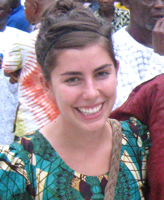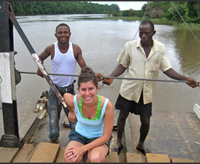
What do Sierra Leone, Croatia, and Ireland have in common? All are the subject of University of Notre Dame senior Catherine Reidy’s undergraduate research. Reidy, a psychology major and anthropology minor in the College of Arts and Letters, spent the past two summers collecting ethnographic research data in Makeni, Sierra Leone.
From the very beginning of her undergraduate career, Reidy has pursued a wide range of internationally-focused academic opportunities across Notre Dame’s campus. Her experiences have culminated in a senior thesis and an academic paper, both to be completed by the end of her senior year.
Before even stepping foot on Notre Dame’s campus, Reidy knew that she was interested in undergraduate research.
“I was really excited about the opportunity to write a senior thesis and to collaborate with faculty, but as a freshman, I didn’t fully understand what research entails.”
Through her involvement in the then-newly-formed International Development Research Council, Reidy interacted with many upperclassmen who encouraged her to seek out international internships, research opportunities, and service programs. After being turned down for a Kellogg Institute for International Studies Internship in India in the fall, Reidy reapplied in the spring and received the internship.
This experience, she says, taught her not to underestimate the value of pursuing every opportunity, no matter how many times you are turned down or how arduous the application process might be.
By the end of her freshman year, Reidy had also been accepted to the Kellogg International Scholars Program, which allowed her to begin undergraduate research as a sophomore. It was through ISP that Reidy met several influential faculty advisers—among them the Kellogg Institute’s Executive Director Steve Reifenberg, and Kellogg Faculty Fellows Paul Ocobock, an assistant professor in the Department of History, and Catherine Bolten, an assistant professor in the Department of Anthropology.

By the end of her sophomore year, Reidy applied for and received a Kellogg Experiencing the World Fellowship to travel to Makeni, Sierra Leone for the summer. There, Reidy began the initial stages of a research project focusing on the interaction of politics and youth in Makeni, with Bolten as her adviser.
During her junior year, Reidy decided to apply for funding to return to Sierra Leone, where she would take on her own research project focusing on the effects of violent conflict and civil war on youth’s future orientations and goals. Reidy received funding through a Kellogg/Kroc Research Grant, allowing her to return to Makeni.
She decided to integrate the research methods she learned from her psychology research with the research methods she uses for her anthropology minor to interview university students in Makeni about their hopes, fears, and dreams for the future in post-conflict Sierra Leone.
In practice, conducting ethnographic research proved to be one of the more challenging aspects of Reidy’s experience in Makeni; she realized that in order to obtain honest answers from her research subjects, it was important for her to build a rapport with the students to make them feel comfortable enough to dialogue with her on their experiences in post-conflict Sierra Leone.
After her summer collecting ethnographic data in Sierra Leone, Reidy returned to campus this fall in a position to integrate all of her academic experiences at Notre Dame into several meaningful projects and post-graduate opportunities.

The culmination of Reidy’s work in Sierra Leone will be an academic paper written through the Department of Anthropology to be prepared for publication in an academic journal and to be presented at two conferences this year.
Her experiences in Sierra Leone also led Reidy to become involved in a psychology lab this year that focuses on ethnic tensions between Croatian and Serbian children in integrated schools in post-conflict Croatia. This research will be the subject of Reidy’s senior thesis, which will be written through the Department of Psychology and, hopefully, Reidy says, will be a piece for future publication.
In addition to these academic pursuits, Reidy is also in the process of applying for the Rhodes and Marshall Scholarships for post-graduate study, through which she hopes to use to obtain a Masters combining aspects of anthropology, psychology, and post-conflict/peace studies.
In looking back over her four years at Notre Dame and at her research experiences, Reidy’s advice for underclassmen is to explore every possible opportunity that Notre Dame offers and to do so as early as possible. Reidy believes that the faculty she interacted with through various Kellogg programs and events, research projects and labs, and the International Development Research Council have shaped her academic experience at Notre Dame.
“Meeting faculty can be as simple as going to their office hours and asking about the faculty member’s research,” Reidy says, and this makes all the difference when seeking out academic opportunities both on campus and beyond.
Learn More >
- Department of Psychology
- Department of Anthropology
- Kellogg Institute for International Studies
- More about Catherine Reidy’s research
- Paul Ocobock faculty page
- Catherine Bolton faculty page
- Kellogg International Scholars Program
- Kellogg Experiencing the World Fellowships
- Video: The Senior Thesis: Independent Research, Student-Inspired
Originally published by at al.nd.edu on December 18, 2012.